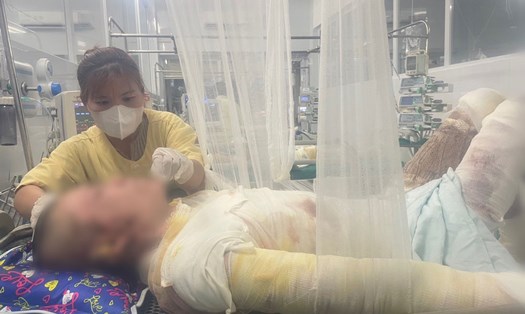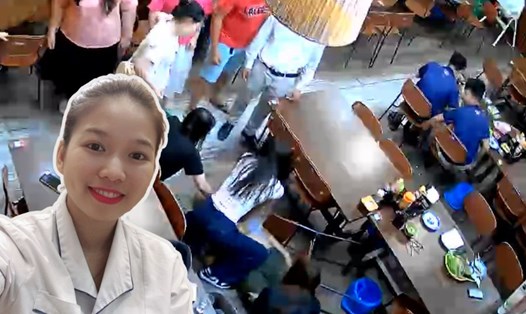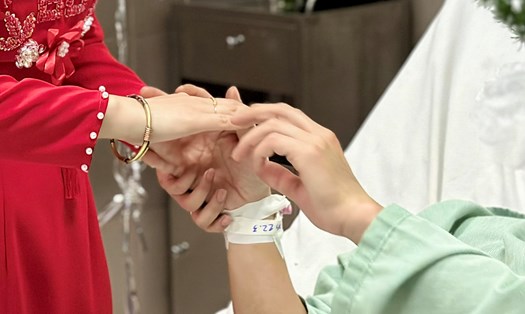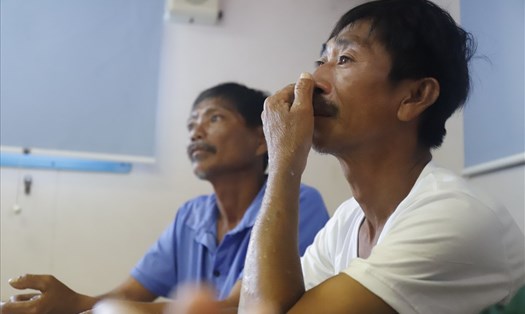The noble mission of a military medic
In the treatment room for patients on ECMO (a method of supporting and maintaining vital functions in patients with severe circulatory or respiratory failure), Captain, Doctor Ta Van Bach (Intensive Care Department, Military Hospital 175 in Ho Chi Minh City) is carefully adjusting the parameters on the ECMO machine for the patient, who is also his teammate.
Doctor Bach said that his teammate had severe community-acquired pneumonia and had been hospitalized for more than 10 days. “The patient was put on a ventilator and connected to an artificial heart and lung system to replace the function of the lungs,” said Doctor Bach.
It is known that cases like Mr. Nam's at the Intensive Care Unit of Military Hospital 175 are not rare. Every day, about 3-5 patients are admitted to the hospital in severe to critical condition.
Doctor Ta Van Bach, born in 1994, is from Hanoi. After graduating from the Military Medical Academy, the young student decided to join the 175 Military Hospital, becoming one of 11 students of Course 46 working at the military's final hospital in the southern region.
Sharing with us, Dr. Bach said that military doctors shoulder two great responsibilities at the same time: they must do a good job of examining, treating, and rescuing patients as a doctor, and they must also undertake other important tasks in the army as an officer. Therefore, the work pressure is extremely high.
“Regarding medical expertise, in order to meet the increasing demand for medical examination and treatment in modern medicine, we must constantly study and improve our knowledge and professional skills, while always updating new techniques to better respond to patient treatment,” said Dr. Bach.
According to Dr. Bach, no matter what role he plays, he and other military doctors consider it a noble mission, always striving to fulfill all duties of a soldier in white uniform.
Unforgettable memories of air ambulances
Recalling the times he directly participated in the Air Rescue Team of Military Hospital 175, Doctor Bach still vividly remembers the journey to Song Tu Tay Island (Truong Sa island district, Khanh Hoa province) to rescue a patient who was a fisherman who suffered a stroke while fishing far from shore. "That was an emergency flight that left a lot of impressions on me" - Doctor Bach recalled.
Doctor Bach said that after doctors on the island consulted remotely with Military Hospital 175, the patient was diagnosed with a stroke and treated according to the protocol. However, the patient responded poorly, showed signs of cerebral edema, and had a severe prognosis, possibly fatal, so they were recommended to be taken to the mainland for treatment.
The patient had signs of cerebral edema, so air travel was difficult. Because the pressure decreases with altitude, the condition worsens. The emergency team asked the pilot to fly lower than usual, instead of at an altitude of 1,500m.
“The flight to bring the patient back to the mainland was very long and difficult. Fortunately, after 2 weeks of intensive treatment, the patient overcame the critical stage and showed good progress, and was discharged from the hospital,” Dr. Bach recalled.
According to Dr. Bach, air ambulance is one of the important and difficult tasks, especially in unfavorable weather conditions such as heavy rain, strong winds or even tropical depressions.
“I myself feel very honored and proud to contribute a small part of my efforts to the overall development of the hospital. Especially in air emergency work” - Dr. Bach shared.
Air ambulance mainly serves officers and fishermen in island areas, helping them stay at sea with peace of mind and successfully implement the military's and the nation's maritime strategies.
As the leading resuscitation unit in the Southern region, the Intensive Care Unit of Military Hospital 175 has become a key to holding on to the fragile lives of critical cases, bringing them back to their families.











